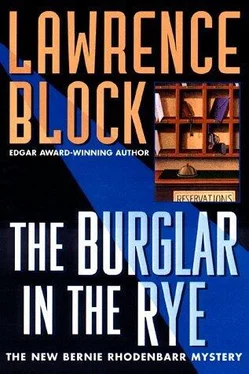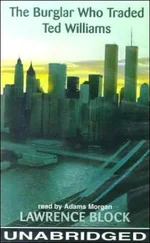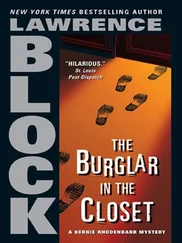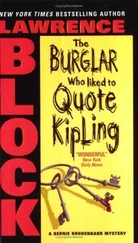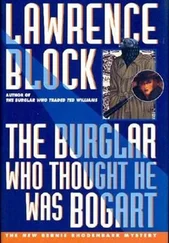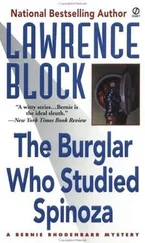“I know how he feels, Bernie. But swing past your apartment first, why don’t you.” His nose wrinkled. “You might want to get under the shower.”
“It’s cigarette smoke,” I said. “I was in the kind of smoke-filled room where they decided to nominate Harding for President.”
“That was a little before my time,” Wally said, “and that’s not just cigarette smoke.”
“You’re a runner,” I said. “I didn’t figure you would mind the smell of good clean sweat.”
“Good clean sweat is one thing,” he said. “Jailhouse sweat is something else. Go on home, Bernie. Take a shower, put on some clean clothes. You got an incinerator in your building?”
“A compactor.”
“Whatever. The clothes you got on? Toss ’em down the chute.”
People talk about burning their clothes, but does any sensible middle-class person ever actually do it? I bundled mine up and ran them over to the laundry around the corner.
My apartment’s on West End and Seventy-first. I’d cabbed there from the Thirteenth Precinct (“the one-three,” as the TV cops would say) on East Twenty-first, and, after a shower and a shave and a change of clothes, I cabbed back down to the store. I usually take subways-they’re usually faster, they’ve got more legroom, and you don’t have to listen to Jackie Mason’s recorded voice urging you to wear a seatbelt. But there’s nothing like a night in a cell to make a man appreciate life’s little refinements, even if there’s precious little refined about them.
It was around eleven by the time I got to the store, and Raffles made it clear that he was glad to see me, rubbing himself against my ankles in the fashion of his tribe. I’m happy you’re here, he was saying, and I’ll be happier when you feed me. I did and he was, and as soon as I had the place up and running I looked up Marty Gilmartin’s number and dialed it.
“I wanted to thank you,” I said.
“It’s nothing.”
“If you’d ever spent a night in a cell,” I said, “you wouldn’t say that.”
“No, I don’t suppose I would. So let me just say that you’re welcome, and that I was glad for the chance to do you a service. It’s been a long time, Bernard.”
“It has,” I agreed. “I haven’t seen you in ages, except for a quick glimpse now and then.”
“Quite. I’m tied up for lunch, dammit, but do you suppose you could drop over to the club sometime this afternoon? Say half past three?”
That would mean closing early, but without his help I wouldn’t be open at all. I told him half past three would be fine, then hung up and waited for the world to beat a path to my door. First of the path-beaters was a fellow in his late thirties, wearing navy slacks and a sportshirt he’d buttoned wrong. He was skinny, with knobby wrists and a prominent Adam’s apple, and his straw-colored hair looked as though it had been cut at the barber college, and by one of their less-promising students. He squinted through rimless eyeglasses at Raffles, who had made short work of his breakfast and was on his way back to the sunny spot in the front window. When the animal had plopped himself down without turning around three times, thus proving conclusively that he wasn’t a dog, the geeky-looking guy turned his pale blue eyes on me.
“He doesn’t have a tail,” he said.
“Neither do you,” I said, “but I wasn’t going to mention it. He’s a Manx.”
“I’ve heard of them,” he said. “They don’t have tails, do they?”
“They’ve outgrown them,” I said, “even as you and I. When you come right down to it, what does a cat in this day and age need with a tail?”
I’d offered this by way of small talk, but he took it seriously, creasing his high forehead in thought. “I wonder,” he said. “Doesn’t it play a role in keeping the animal balanced?”
“He sees a therapist once a week,” I said, “and when he has a problem we talk about it.”
“Physically, I meant.”
Duh. I let him speculate on the role of the feline caudal appendage in maintaining the animal’s equilibrium and the possible evolutionary advantage of taillessness on the Isle of Man, the breed’s ancestral home, but I didn’t contribute much to the conversation myself beyond the occasional nod or grunt. I didn’t want to waste wit on him, since he didn’t seem to know what it was, nor did I want to inquire too closely into Raffles’s origins.
Because, when you come right down to it, I’ve never been entirely certain that Raffles is a Manx. He doesn’t look a lot like any photos I’ve seen of Manx cats, nor does he have the breed’s characteristic hopping gait. What he looks like, really, is a garden-variety gray tabby who lost his tail in some unrecorded accident, and who has learned to live without it.
He’d learned, God knows, to live without any number of other things to which he was once presumably attached. Although he still seeks to sharpen them on the furniture, his claws are but a memory, surgically removed before Fate (and Carolyn Kaiser) brought him into my life. And, although he is in attitude and temperament an outstanding example of feline masculinity, two emblems of his maleness have, alas, had similar surgical alteration.
Since this last point makes breeding him out of the question, it renders his bloodlines largely academic. As far as I’m concerned, he’s a Manx, and a fine one in the bargain. How he got that way is no concern of mine.
“…Gulliver Fairborn,” my visitor was saying.
That got my attention, which he’d hitherto succeeded in losing. I looked up and there he was, eyes wide, waiting for me to answer a question of which I’d heard only the last two words. I tried to look blank, and I have to say it comes easy to me.
“Let me explain,” he said.
“Perhaps that would be best.”
“All I need,” he said, “are photocopies. Do whatever you want with the originals. It’s not the letters I’m interested in. It’s their contents, it’s knowing what they say.”
I could have told him the letters were as hard to trace as Raffles’s tail, but what was my hurry? He was a lot more interesting now than when he’d been discussing my cat. “I don’t think I got your name,” I said. “Mine is-”
“Rhodenbarr,” he said. “Did I pronounce it correctly?”
The place some people go wrong is the first syllable. The O is long, as in “Row, row, row your boat,” and that’s how he’d rendered it. “Either you got it right,” I said, “or my parents lied to me. And you are…”
“Lester Eddington.”
I waited for the name to ring a bell. When you own a bookstore, you recognize the names of thousands of authors. They are, after all, quite literally one’s stock in trade. I may not know anything about a writer, I may never have read a word he’s written, but I tend to know the titles of his books and what shelf to put them on.
I just knew this bird was a writer, but his name was new to me, and I found out why when he explained that he hadn’t published anything yet, except for articles in academic journals that I’d been lucky enough to miss. But this didn’t mean he hadn’t been writing. For almost twenty years he’d been hard at work on a book about a subject that had preoccupied him since he was-surprise!-seventeen years old.
“Gulliver Fairborn,” he said. “I read Nobody’s Baby and it changed my life.”
“That’s what everybody says.”
“But in my case it really did.”
“That’s the other thing that everybody says.”
“In college,” he said, “I wrote paper after paper on Gulliver Fairborn. You’d be surprised how many courses you can fit him into besides English Lit. ‘Changing Attitudes on Race in America as revealed in the works of Gulliver Fairborn’-that worked fine in freshman sociology. For art history, I discussed the novels as literary reflections of abstract expressionism. I had a little trouble in earth science, but everything else fell into place.”
Читать дальше
